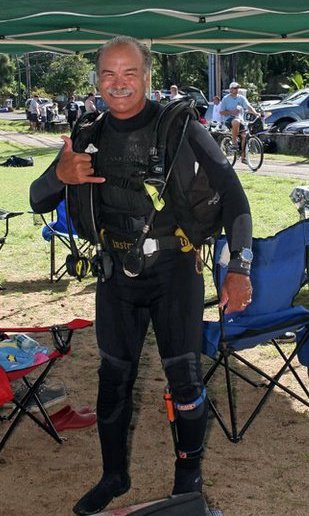We sat down with Course Director extraordinaire, Larry Grayson, to pick his brain on the Pacific Diving Academy professional scuba diving program(s). Larry has been a professional scuba diver for over 35+ years. He is the primary instructor for Pacific Diving Academy’s programs including: Divemaster (DM), Assistant Instructors (AI), Open Water Scuba Instructors (OWSI), Master Scuba Diver Trainer (MSDT) and IDC Staff Trainer. Learn more about Larry and his many accomplishments here.
What do you hope students get out of their Pacific Diving Academy course?
I hope that students understand that they are now ambassadors for the ocean. That they are in PADI’s words ‘torch bearers for the ocean’. I hope that they develop the desire and attitude to pass to their students that we need to become advocates for the ocean. That they are role models in their diving. I want them to think about what they can do – on the surface or in the water – to minimize their impact on the ocean as a professional.
The ocean is our office, our classroom, but mostly it is our playground. That provides all of us a sense of joy, awe, and wonder of every animal, every entity that is part of that ecology.
What is something that you want students to know before they start the program?
“It is a program based on quality. We take in student’s individual histories, personal work, needs and schedules into account. This program takes in context their life and diving experienced.”
What is your ultimate professional goal for students after they complete the course?
My goal is that they continue to be professional scuba dive educators. My goal is that I have trained them to always be looking to improve their skill, their knowledge and their teaching techniques. And that 3 years down the road when I see them in the water, they are having fun!
What are the most common mistake(s) students throughout the program?
Lack of punctuality – I show up early, very prepared and I stay late.
When students don’t take responsibility for their own learning and/or completing their requirements in the classroom and digital
The more they act like a professional, the more I will treat them like a professional.
It is a lot easier when they are proactive. Completing assignments digital or otherwise, planning ahead for classroom and ocean session. Completing knowledge assessments. And using me as a resource for the training cycle of events.
What advice do you have for scuba professionals to prevent burn out?
Variety is the spice of the ocean! I advise you to look upon every dive as your first dive. To look – not for the sameness but for the changes that they will come upon in the ecology and the sea creatures that they dive with.
Do you have any advice for divers who are excited about the diving aspect but hesitant about the teaching aspect?
Trust yourself. You will learn your strengths and weaknesses dealing with divers, students and certified divers. Every sealife moment is a teaching event. Take advantage of that sealife moment to get everyone around you excited and motivated to protect our oceans.
What do you think about diving in Hawaii?
As a course director, I have dove all over the world. Diving in Hawaii is the Disneyland ride of scuba diving. 33% of the species we have in Hawaii you will not see in another part of the world. Other places the viz may be greater, the water may be warmer or the coral may be more vibrant. But the indigenous species in Hawaii are so colorful and different. Lucky we live and dive Hawaii.
What does the program mean to you for military members and veterans?
20 years in the military myself. I was an enlisted member originally. I became a warrant officer then I became a limited duty officer. Now, I am a veteran. So I have walked the mile. I know what it is like to come up through the ranks. As someone who came up through the ranks, I am aware that the military gives us a skill set that allows us to be successful in professional scuba diving and in the Pacific Diving Academy program.
What is it like working and training with Military members and veterans?
There is a bond. The PDA program looks to establish and build upon the bonds and relationships that you have with other military members. The Pacific Diving Academy professional scuba programs build upon that brotherhood and sisterhood that was built from bootcamp or basic school in the military branches.
Thank you to CD Larry Grayson for sitting down with us and giving us an insight into what it means to be a professional scuba diver, what to look forward to in the program and in your professional scuba career.
